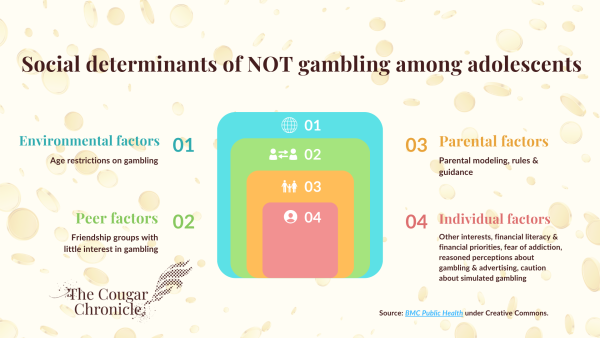For the purposes of this article regarding gambling, the names of our sources are kept anonymous.
Staring into his dimly lit phone in the dead of night, Green promised himself—one last thing before bed. By the time he was done, he prayed for the best and his eyes sank for a few hours.
Come morning, he ran his routine: slipping out of bed, taking a shower, getting dressed, grabbing breakfast and coming out the door. Green pulled out the driveway and made his way to Cy Creek, his mind wandering until he checked his phone.
In the time it took for him to get ready, he was $316 in the green from the bet he made the night before.
“I don’t think I’ve lost any. I don’t just break even—it’s a lot better.”
According to an article by The Washington Post, legal gambling in the U.S. has steadily risen after a 2018 Supreme Court decision that struck down several sports betting restrictions.
Now, sports betting is exploding in popularity—especially among high schoolers.
“It’s always a risk, but it’s kind of fun to put some money on the line for it. Especially if you get more than what you put in,” Green explained.
Addicting Apps
With 45% of sports bets being placed online, teenagers are much more exposed to gambling than ever before, according to the National Council on Problem Gambling, the oldest nonprofit organization on gambling issues in the U.S.
“At first [I thought] it was confusing and it seemed so complicated, but as I started learning more about it, I thought it was cool,” high school senior Gold said.
Sports betting has a strong presence online. Just take for example Stake, which injects its advertising into seemingly random social media posts.

“For me, it adds another layer of excitement to the game,” Gold explained. “I usually bet on soccer games, and if the team wins, I win—that adds an umph to that feeling.”
Excitement-seeking gambling, as a 2022 study by the Journal of Problem Gambling shows, targets young men the most because they often lack enough satisfaction and social support in their daily lives.
Additionally, “of the 2,030 adolescents included in analyses, 1,360 (67 %) reported ‘excitement’ as a reason why they gambled.”

Looking beyond the money
Such excitement can affect what these teenagers perceive as a win or loss and how they handle their money.
“I have lost in the hundreds, but it’s never been so much that I need to tell myself to stop,” Gold added.
To this end, peers are a key factor in how much and how often these vulnerable teenagers end up betting. For Green, he often has to be the one telling his friends to stop.
“I don’t think [my friends] have self-control. I think it’s an addiction—some people can bet easily and some people just want to keep trying to win big.”
Despite these numbers and adorning his jersey, Gold insisted that above all, he is a fan first before a bettor. Nothing could compare to the time when his favorite team fought the odds and pulled out a tense victory.
But for people like Silver, with a profitable investment portfolio at the age of 17, sports betting couldn’t be any more senseless.
“The difference between sports betting and investing is that investing is tangible,” Silver said. “When you’re doing good, it’s because the company is doing good. When you win in sports betting, you’re getting lucky.”
It’s not that Silver isn’t a fan of sports. In fact, he explained how unfortunate it is that gambling has taken over the low-stakes fantasy leagues he used to enjoy.
“When you start sports betting, you kind of lose the love of the game.”
A risk we cannot take
Whether mentally or financially, parents and teachers should realize that legal gambling is becoming a widespread problem for high school students. With just a few quick taps on your phone, teenagers can develop a potentially life-changing addiction.
Because these students aren’t just betting for fun, they’re betting with pride.
When asked if he would recommend people try betting, Green immediately answered: “Absolutely,” he said. “I can stop whenever I want to.”
If you, or someone you know, struggle with gambling, the National Problem Gambling Helpline provides professional help and information about gambling addiction. Call 1-800-GAMBLER or send a text to 800GAM.









